浙江七年级上册1-9单元英语复习
(完整word版)人教版英语七年级上册各单元基础知识总复习

七年级英语(上册)unit1-10重点、难点知识汇点总复习(Starter) Unit 1---Unit3Unit 1 (标题)_____________________________________Unit 2 (标题) _____________________________________Unit 3 (标题) _____________________________________1.一Good morning / afternoon / evening.早上好/ 下午好/晚上好。
2.一How are you!你好吗?一I ' m, thanks.我很好,谢谢!—?你呢?(你好吗?)--------------- I'm fine, too.注意:How is your mother?你的妈妈好吗? She is fine.她身体好。
例如:Tom is fine.(提问)Tom?3.What' shis in English?这个用英语怎么说?(= _ _ ? 这个是什么?) a map / an orange.它是一张地图/一个桔子。
例如:This is a pen.信问)this (in English)? That is an apple.得问) ?冠词a, an的用法是:。
例如:an apple, an orange,_an egg_an ice-cream_an eraser,an ID card, an English book / boy / girl / party / Day,an art festival , an hour,_an aunt , an uncle, 注意:a, an ,the 用法:第一次提到用_____________________ 或第二次再次提到时用.如:That ' s ruler. ruler is blue.4.—Spell it, please.请拼写它.=it?你怎样拼写它?一P-E-N.5. is it? 它是什么颜色?red.它是红色。
七年级上册英语1到9单元知识点

七年级上册英语1到9单元知识点In the first nine units of the seventh grade English textbook, students will learn a variety of topics ranging from introductions and greetings to describing people and places, as well as talking about hobbies and daily routines. These fundamental language skills are essential for building a strong foundation in English language learning.在七年级英语教材的前九个单元,学生将学习从介绍和问候到描述人物和地点,以及谈论爱好和日常生活的各种主题。
这些基本语言技能对于建立英语语言学习的坚实基础至关重要。
Unit 1 focuses on greetings and introductions, teaching students essential phrases like "hello," "goodbye," and "Nice to meet you." Building relationships and starting conversations are key aspects of language learning, and mastering these basics will help students communicate effectively in real-life situations.第1单元重点介绍了问候和介绍,教授学生像“你好”、“再见”和“很高兴见到你”等基本短语。
人教版七年级英语上册unit1--9单元综合复习题及答案
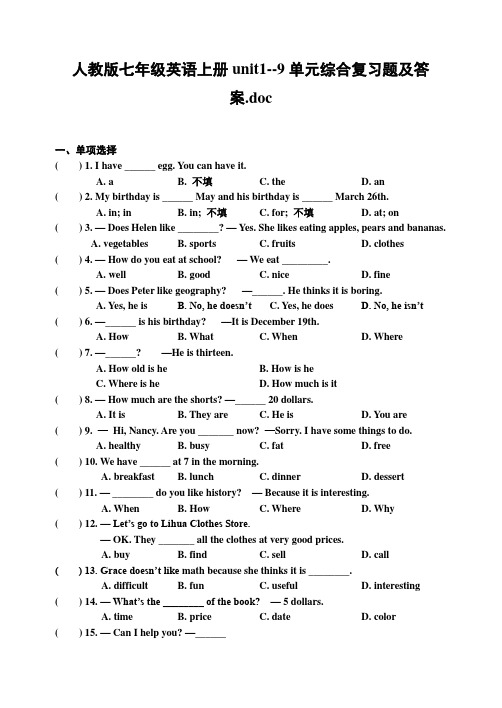
人教版七年级英语上册unit1--9单元综合复习题及答案.doc一、单项选择( ) 1. I have ______ egg. You can have it.A. aB. 不填C. theD. an( ) 2. My birthday is ______ May and his birthday is ______ March 26th.A. in; inB. in; 不填C. for; 不填D. at; on( ) 3. — Does Helen like ________? — Yes. She likes eating apples, pears and bananas.A. vegetablesB. sportsC. fruitsD. clothes( ) 4. — How do you eat at school? — We eat _________.A. wellB. goodC. niceD. fine( ) 5. — Does Peter like geography? —______. He thinks it is boring.A. Yes, he isB. No, he doesn’tC. Yes, he doesD. No, he isn’t ( ) 6. —______ is his birthday? —It is December 19th.A. HowB. WhatC. WhenD. Where( ) 7. —______? —He is thirteen.A. How old is heB. How is heC. Where is heD. How much is it( ) 8. — How much are the shorts? —______ 20 dollars.A. It isB. They areC. He isD. You are( ) 9. —Hi, Nancy. Are you _______ now? —Sorry. I have some things to do.A. healthyB. busyC. fatD. free( ) 10. We have ______ at 7 in the morning.A. breakfastB. lunchC. dinnerD. dessert( ) 11. — ________ do you like history? — Because it is interesting.A. WhenB. HowC. WhereD. Why( ) 12. —Let’s go to Lihua Clothes Store.— OK. They _______ all the clothes at very good prices.A. buyB. findC. sellD. call( ) 13. Grace doesn’t like math because she thinks it is ________.A. difficultB. funC. usefulD. interesting ( ) 14. —What’s the ________ of the book? — 5 dollars.A. timeB. priceC. dateD. color( ) 15. — Can I help you? —______A. Y es, please. I want a hat.B. You’re welcome.C. I’m fine. Thanks.D. Here you are.二、阅读理解(A)Mr Clark goes to a dinner party in old clothes. He comes into the room, but the people in the room don’t look at him. They don’t ask him to sit at the table.Mr Clark goes home and puts on (穿上) his good clothes. He goes back to the party. People in the room stands up and smiles at him. They give him very good food to eat.Mr Clark takes off his clothes, and puts them in the food and say, “Eat,clothes!”The other people ask, “What are you doing?”He answers, “I’m asking my c oat (外套) to eat food. When I am wearing my old clothes, y ou don’t look at me.You don’t ask me to sit down. Now I am in these clothes. And you give me very good food. Now I know, you give the food to my clothes, not to me!”根据短文内容,选择最佳答案。
浙江省人教版七年级上册英语单词、词组过关
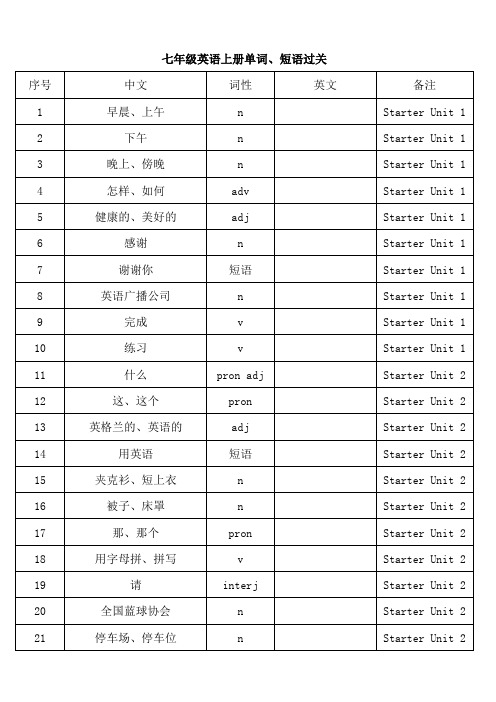
第五十一
num
154
第六十
num
155
第六十一
num
156
第七十
num
157
第七十一
num
158
第八十
num
159
第八十一
num
Unit 8 Unit 8 Unit 8 Unit 8 Unit 8 Unit 8 Unit 8 Unit 8 Unit 8 Unit 8 Unit 8 Unit 8 Unit 8 Unit 8 Unit 8 Unit 8 Unit 8 Unit 8 Unit 8 Unit 8 Unit 8 Unit 8 Unit 8
adj
用英语
短语
夹克衫、短上衣
n
被子、床罩
n
那、那个
pron
用字母拼、拼写
v
请
interj
全国蓝球协会
n
停车场、停车位
n
备注 Starter Unit 1 Starter Unit 1 Starter Unit 1 Starter Unit 1 Starter Unit 1 Starter Unit 1 Starter Unit 1 Starter Unit 1 Starter Unit 1 Starter Unit 1 Starter Unit 2 Starter Unit 2 Starter Unit 2 Starter Unit 2 Starter Unit 2 Starter Unit 2 Starter Unit 2 Starter Unit 2 Starter Unit 2 Starter Unit 2 Starter Unit 2
160
第九十
161
第九十一
新人教版七年级上册1-9单元复习-LUCKY

新人教版七年级上册1-9单元复习-LUCKY七上Unit1-3复习一、短语过关1、她的名字2、姓3、名4、电话号码5、在中国6、我知道了7、两张全家福8、在下一张照片里9、过得愉快10、……怎么样11、因……而感谢12、请求,恳求13、打电话给某人14、劳驾,打扰一下15、一串钥匙16、电脑游戏17、身份证二、句子翻译1、这些是我的朋友。
2、你爸爸的电话号码是多少?3、这不是我的包,是他的。
4、谢谢你的全家福照片。
5、我的朋友在中国,他姓张,名亮亮。
三、语法填空1. Here ( )two pictures in my notebook .A. amB. isC. are2. His name is Thomas , but we all like to call ( ) Tom . A. hisB. himC. himself3. – ( ) is the girl ? - She is my sister .A. WhoB. WhatC. Where4. Lily has ( ) e-mail address . It’s lily@/doc/35e981e3647d27284a73512b.h tmlA. aB. anC. the5. –Hello ! My name ( ) Tony . –Hi , I ( ) Linda.A. is , isB. am , amC. is , am6. That’s ( ) brother’s shirt . It isn’t ( ).A. my , yourB. his , yoursC. yours , mine7. Please call Gina ( )8361396 .A. atB. toC. in8. –( ) do you spell “baseball”?- B-A-S-E-B-A-L-LA. What’sB. WhatC. How 9. What is this ( ) English ?A. inB. onC. for10. – Is that your schoolbag ? –( ).It’s his .A. No ,it isn’t.B. No , he isn’t.C.Yes , it is .四、真题演练1. – Rose , could you please water the flowers in the garden ? –Why ( ) ? You see , my brother is listening to music .A. meB. IC. mine2. - Jane , is this your umbrella ?- No , it’s not ( ). I didn’t take one this morning .A. meB. myC. mine3. My mother used to make breakfast for ( ) every morning , but now I do it myself .A. mineB. myC. me4. Helen loves reading . She has read ( ) books this month .A. fiveB. fifthC. five of5. – Sally , may I use your iPad ? ( ) is broken . - OK , here you are .A. MyB. YoursC. Mine6. – Is this your schoolbag ?- No , it isn’t .( ) is under the desk .A. MyB. MineC. Me7. Here are some ( ). Do you like ( )?A. oranges , themB. orange , itC. oranges , they8. Uncle Tom will come to visit ( ) next Saturday .A. weB. usC. our9. Mrs. Smith often goes to visit those AIDS patients in hospitals to cheer ( ) up .A. herB. themC. us10. Everybody except Mike and Linda ( ) there when the meeting began .A. isB. areC. am七上Unit4-6复习一、短语过关1、在沙发上2、铅笔盒3、快点儿4、在头上5、我不知道6、录音机7、飞机模型8、乒乓球拍9、足球10、我们走吧11、看电视12、和……玩……13、下课后14、生日晚宴15、思考、思索16、下周17、走后一个问题18、健康的食物19、饮食习惯20、对于早餐二、句子翻译1、我的夹克在床上。
七年级上册英语1-9单元知识点总结

七年级上册英语1-9单元知识点总结如下:第一单元:My name's Gina.- 主要学习了问候语、自我介绍、询问他人姓名及回答等基本交际用语。
- 学习了一些常见的名词和形容词,如name, first name, last name, friend, China, Canada 等。
- 学习了一些基本的句型结构,如What's your name? My name's...等。
第二单元:Is this your pencil?- 主要学习了物品归属的表达方式,如Is this your pencil? Yes, it is. / No, it isn't. - 学习了一些常见的物品名称,如pencil, pen, book, eraser等。
- 学习了一些基本的句型结构,如Is this/that your...? Are these/those your...?等。
第三单元:This is my sister.- 主要学习了家庭成员的称呼,如sister, brother, mother, father等。
- 学习了介绍家人的常用句型,如This is my sister. That's my brother.- 学习了一些基本的形容词,如old, young, tall, short等。
第四单元:Where's my backpack?- 主要学习了询问物品位置的表达方式,如Where's my backpack? It's under the table. - 学习了一些常见的地点名词,如school, desk, chair, bed等。
- 学习了一些基本的介词,如on, in, under等。
第五单元:Do you have a soccer ball?- 主要学习了询问他人拥有某物的表达方式,如Do you have a soccer ball? Yes, I do. / No, I don't.- 学习了一些常见的运动器材名称,如soccer ball, basketball, volleyball等。
浙教版初中七年级(上)英语各章知识点汇总
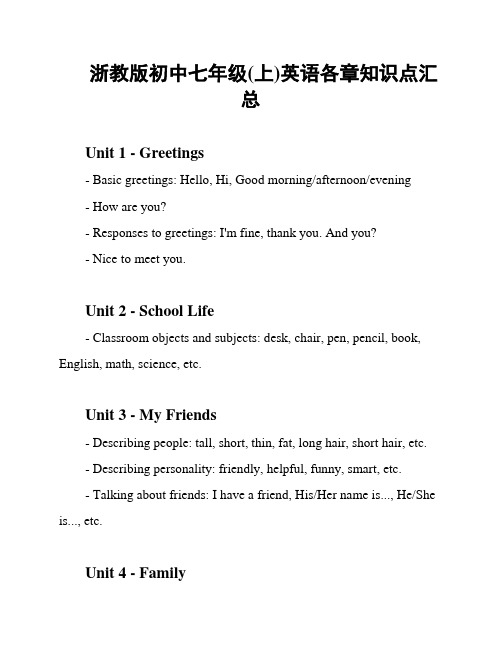
浙教版初中七年级(上)英语各章知识点汇总Unit 1 - Greetings- Basic greetings: Hello, Hi, Good morning/afternoon/evening- How are you?- Responses to greetings: I'm fine, thank you. And you?- Nice to meet you.Unit 2 - School Life- Classroom objects and subjects: desk, chair, pen, pencil, book, English, math, science, etc.Unit 3 - My Friends- Describing people: tall, short, thin, fat, long hair, short hair, etc.- Describing personality: friendly, helpful, funny, smart, etc.- Talking about friends: I have a friend, His/Her name is..., He/She is..., etc.Unit 4 - Family- Family members: father, mother, brother, sister, grandfather, grandmother, etc.- Describing family members: He/She is my..., etc.- Talking about family: How many people are there in your family?I have a small/big family, etc.Unit 5 - Numbers- Numbers 0-100: zero, one, two, three, four, five, six, seven, eight, nine, ten, etc.- How to ask and tell age: How old are you? I'm __ years old.- Counting objects or people: I have __ pens, There are __ students in the classroom, etc.Unit 6 - Colors and Clothes- Basic colors: red, blue, yellow, green, black, white, etc.- Describing clothes: shirt, pants, skirt, dress, shoes, etc.- Talking about clothes: I like wearing..., What color is your...?, etc.Unit 7 - My Schoolbag- Schoolbag items: pencil case, notebook, ruler, eraser, etc.- Describing size, shape, and color of items: big, small, round, square, blue, black, etc.- Talking about personal belongings: In my bag, I have..., What's in your bag?, etc.Unit 8 - Fruits and Food- Describing taste: sweet, sour, etc.- Talking about preferences: I like eating..., Do you like...?, etc.Unit 9 - Hobbies and Activities- Hobbies: swimming, running, singing, dancing, playing soccer, etc.- Talking about hobbies: I like..., I enjoy..., etc.- Inviting others to join activities: Do you want to...?, Let's... together, etc.Unit 10 - Places in the Neighborhood- Giving directions: Go straight, turn left/right, on the left/right, etc.- Talking about locations: Where is the...?, It's next to/in frontof/behind..., etc.Unit 11 - Daily Routines- Daily activities: get up, have breakfast, go to school, have lunch, do homework, etc.- Talking about routines: I usually..., What do you usually do...?, etc.- Expressing time: in the morning/afternoon/evening, at __ o'clock, etc.Unit 12 - Weather- Weather conditions: sunny, cloudy, rainy, windy, snowy, etc.- Talking about weather: It's..., What's the weather like...?, etc.- Describing clothing for different weather: Wear a coat, bring an umbrella, etc.以上是浙教版初中七年级(上)英语各章知识点的简要总结。
七年级英语上册1-9单元重点.难点及易考点总结

七年级英语上册1-9单元重点,难点及考点总结Unit 1 My name is Gina.1. 称代词各种形式.【中考链接】You have more pens than ______. But ______ are nicer than _______.A. I. mine. yoursB. I. my. yoursC. me. mine. youD. my. mine. you2. first name=given name (名) last name = family name=surname (姓) full name(全名:姓+名)英美人姓名的表达与中国人不同。
英美人名在前,姓在后,有时中间会有middle name. 例如:Jan e·Eyre 其中Jane是名,Eyre 是姓。
Jim Allen Green其中Jim是first name(given name) Allen是middle name Green是family name(last name or surname)3. (1) first 序数词,第一,序数词前要加the. the first page.(2)1-10的序数词形式必须会写first, second, third, fourth, fifth, sixth, seventh, eighth, ninth, tenth.【中考链接】Her name Mary King. King is her_________.A. family nameB. first nameC. middle nameD. full name4. 分数的表达方式。
分母基数词,分子序数词,分母大于1,分母加s. 例如:3/4 three fourths5. number 数字the number of “……的数目”谓语动词用单数形式。
a number of…相当于many,谓语动词用复数形式。
七年级上册英语1到9单元知识点总结
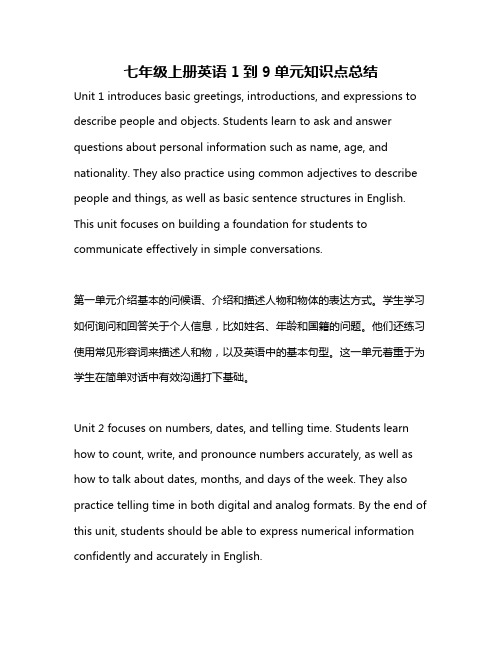
七年级上册英语1到9单元知识点总结Unit 1 introduces basic greetings, introductions, and expressions to describe people and objects. Students learn to ask and answer questions about personal information such as name, age, and nationality. They also practice using common adjectives to describe people and things, as well as basic sentence structures in English. This unit focuses on building a foundation for students to communicate effectively in simple conversations.第一单元介绍基本的问候语、介绍和描述人物和物体的表达方式。
学生学习如何询问和回答关于个人信息,比如姓名、年龄和国籍的问题。
他们还练习使用常见形容词来描述人和物,以及英语中的基本句型。
这一单元着重于为学生在简单对话中有效沟通打下基础。
Unit 2 focuses on numbers, dates, and telling time. Students learn how to count, write, and pronounce numbers accurately, as well as how to talk about dates, months, and days of the week. They also practice telling time in both digital and analog formats. By the end of this unit, students should be able to express numerical information confidently and accurately in English.第二单元侧重于数字、日期和时间的表达。
英语七上1~9单知识点总结
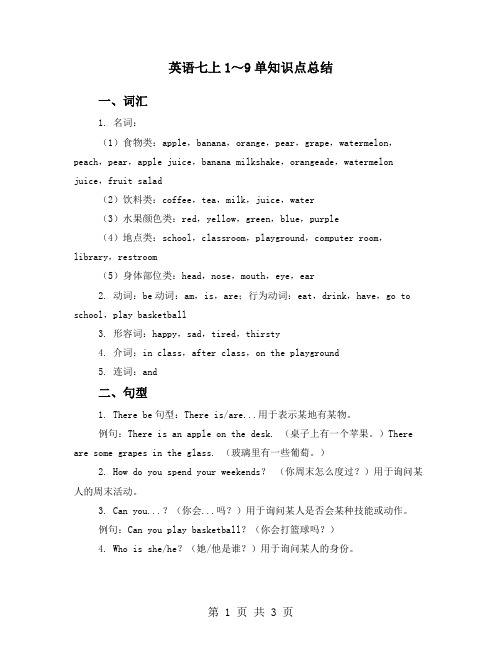
英语七上1~9单知识点总结一、词汇1. 名词:(1)食物类:apple,banana,orange,pear,grape,watermelon,peach,pear,apple juice,banana milkshake,orangeade,watermelon juice,fruit salad(2)饮料类:coffee,tea,milk,juice,water(3)水果颜色类:red,yellow,green,blue,purple(4)地点类:school,classroom,playground,computer room,library,restroom(5)身体部位类:head,nose,mouth,eye,ear2. 动词:be动词:am,is,are;行为动词:eat,drink,have,go to school,play basketball3. 形容词:happy,sad,tired,thirsty4. 介词:in class,after class,on the playground5. 连词:and二、句型1. There be句型:There is/are...用于表示某地有某物。
例句:There is an apple on the desk. (桌子上有一个苹果。
)There are some grapes in the glass. (玻璃里有一些葡萄。
)2. How do you spend your weekends?(你周末怎么度过?)用于询问某人的周末活动。
3. Can you...?(你会...吗?)用于询问某人是否会某种技能或动作。
例句:Can you play basketball?(你会打篮球吗?)4. Who is she/he?(她/他是谁?)用于询问某人的身份。
5. Who is younger/taller/thinner...?(谁更年轻/高/瘦...?)用于比较两人之间的年龄、身高、体重等。
七年级上册英语1~9单元知识汇总

七年级上册英语1~9单元知识汇总Here is the English essay with the title "Summary of English Knowledge for Units 1-9 in Grade 7 Upper Volume":The first unit we learned in 7th grade English was all about introductions and greetings. We practiced saying hello and goodbye in different ways, as well as introducing ourselves and asking others to introduce themselves. We focused on basic personal information like name, age, and where we are from. This laid an important foundation for being able to engage in simple conversations in English.In the second unit, the topic shifted to family. We learned vocabulary related to family members like mother, father, brother, and sister. We practiced describing our families, including talking about the ages and occupations of our family members. This helped us build our language skills for talking about personal details and relationships.Unit three was all about daily routines. We explored vocabulary for common daily activities like waking up, getting dressed, going to school, and going to bed. We practiced using time expressions like in the morning, at noon, and in the evening to describe when we dodifferent things throughout the day. This unit was helpful for being able to talk about our own schedules and habits.The fourth unit focused on free time and hobbies. We learned words for various leisure activities like reading, playing sports, and listening to music. We discussed what kinds of things we enjoy doing in our free time and the reasons why. This expanded our ability to talk about our personal interests and preferences.In unit five, the topic was food. We explored a wide range of vocabulary related to different types of food and drinks. We also learned about meal times and ordering food. This unit gave us the language tools to talk about our eating habits and describe our favorite foods.For unit six, the focus shifted to shopping. We learned useful words and phrases for going to the store, looking at products, and making purchases. This included vocabulary for clothes, prices, and asking questions. Being able to discuss shopping was an important real-world skill.The seventh unit was about animals. We explored words for different kinds of pets and wild animals, as well as their physical characteristics and habitats. This helped us develop our descriptive language abilities when talking about the natural world.In unit eight, the topic was places in a city. We learned vocabulary for locations like the bank, the park, and the theater, as well as how to give and follow directions. This unit expanded our language for talking about our local environments and navigating them.Finally, the ninth unit was about the weather. We explored a range of weather-related vocabulary, like sunny, rainy, and snowy. We also practiced describing the current weather conditions and talking about our preferences for different types of weather. This unit gave us more tools for discussing the natural environment around us.Overall, these first nine units of 7th grade English provided a solid foundation of vocabulary and conversational skills across a variety of everyday topics. By mastering this knowledge, we have gained the ability to engage in basic interactions and discussions in English, which will continue to be built upon throughout the rest of the school year.。
Unit 1-9 期末复习课件 2022-2023学年人教版英语七年级上册
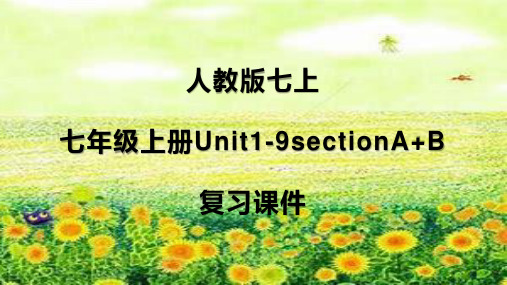
单词复习
1.在电视上看它们watch them on T V 2.在学校里at school 3.下课后after class 4.迟到be late 5.对某人来说... (是怎么样的) It's ... for
sb. 6.那听起来...That sounds ... 7.做运动do sports / play sports 8.喜爱运动love sports
单词复习
as far as就……而论 carev.在意;担忧;关心 ①care about关心;在意 ②care for 喜欢;照料 take care 小心;当心;保重 ②take care of 照顾;照料 close紧闭,靠近,接近 make up 编造
单词复习
他的电话号码 his phone number 我的母亲 my mother 很高兴见到你 Nice to meet you. 我也很高兴见到你 Nice to meet you, too.
人教版七上 七年级上册Unit1-9sectionA+B
复习课件
今日复习的重点
1-9单元的复习课件 1-9单元的单词
单词复习
早上好 Good morning 中午好 Good afternoon 晚上好 Good evening 晚安 Good night 家谱 family tree 电话号码 telephone number 我的名字 my name 他的名字his name 她的姓 her last name 你的名字 your first name
irthday let’s=let us have straberries and apples an apple You are right the food
初一上册英语复习提纲浙教版
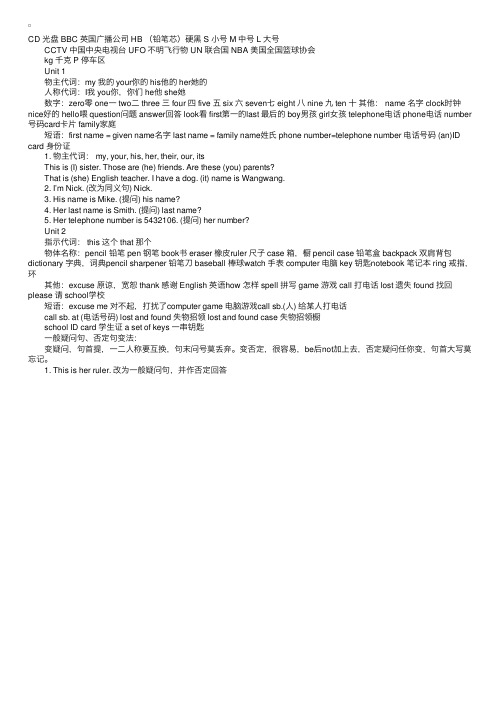
CD 光盘 BBC 英国⼴播公司 HB (铅笔芯)硬⿊ S ⼩号 M 中号 L ⼤号 CCTV 中国中央电视台 UFO 不明飞⾏物 UN 联合国 NBA 美国全国篮球协会 kg 千克 P 停车区 Unit 1 物主代词:my 我的 your你的 his他的 her她的 ⼈称代词:I我 you你,你们 he他 she她 数字:zero零 one⼀ two⼆ three 三 four 四 five 五 six 六 seven七 eight ⼋ nine 九 ten ⼗其他: name 名字 clock时钟nice好的 hello喂 question问题 answer回答 look看 first第⼀的last 最后的 boy男孩 girl⼥孩 telephone电话 phone电话 number 号码card卡⽚ family家庭 短语:first name = given name名字 last name = family name姓⽒ phone number=telephone number 电话号码 (an)ID card ⾝份证 1. 物主代词: my, your, his, her, their, our, its This is (I) sister. Those are (he) friends. Are these (you) parents? That is (she) English teacher. I have a dog. (it) name is Wangwang. 2. I’m Nick. (改为同义句) Nick. 3. His name is Mike. (提问) his name? 4. Her last name is Smith. (提问) last name?5. Her telephone number is 5432106. (提问) her number? Unit 2 指⽰代词: this 这个 that 那个 物体名称:pencil 铅笔 pen 钢笔 book书 eraser 橡⽪ruler 尺⼦ case 箱,橱 pencil case 铅笔盒 backpack 双肩背包dictionary 字典,词典pencil sharpener 铅笔⼑ baseball 棒球watch ⼿表 computer 电脑 key 钥匙notebook 笔记本 ring 戒指,环 其他:excuse 原谅,宽恕 thank 感谢 English 英语how 怎样 spell 拼写 game 游戏 call 打电话 lost 遗失 found 找回please 请 school学校 短语:excuse me 对不起,打扰了computer game 电脑游戏call sb.(⼈) 给某⼈打电话 call sb. at (电话号码) lost and found 失物招领 lost and found case 失物招领橱 school ID card 学⽣证 a set of keys ⼀串钥匙 ⼀般疑问句、否定句变法: 变疑问,句⾸提,⼀⼆⼈称要互换,句末问号莫丢弃。
[人教版]中考英语总复习七年级上册Unit1-9
![[人教版]中考英语总复习七年级上册Unit1-9](https://img.taocdn.com/s3/m/70ed0d82ed3a87c24028915f804d2b160b4e86b9.png)
[人教版]中考英语总复习七年级上册Unit1-9第1讲七年级英语上册Unit1-9一、重点词汇1.my(pron.)→___(名词性物主代词)我的2.one(num.)→___(序数词)第一3.good(adj.)→___(adv.)好;对;满意地4.family(n.)→___(复数)家庭5.thi(pron.)→____(复数)这些6.friend(n.)→___(adj.)友好的→___(adj.)不友好的→___(n.)友谊7.thoe(pron.)→___(单数)那个8.nine(num.)→___(序数词)→___(十九)→___(九十)9.eay(adj.)→___(adv.)容易地10.help(v.&n.)→___(adj.)有益的11.know(v.)→___(过去式)→___(过去分词)知道12.many(adj.)→___(比较级)更多的→___(最高级)最多13.intereting(adj.)→____(n.&v.)兴趣;爱好;对……感兴趣→____(adj.)感兴趣的14.difficult(adj.)→___(n.)困难→___(adj.反义词)容易的15.rela某ing(adj.)→____(adj.)感到轻松的→____(v.)使轻松16.healthy(adj.)→___(n.)健康17.really(adv.)→___(adj.)真的→____(adj.同义词)真的18.fat(adj.)→___(adj.反义词)瘦的19.good/well→____(比较级)→____(最高级)20.buy(v.)→____(现在分词)→______(过去式)购买21.ell(v.)→_____(n.)特价销售;出售22.favorite(adj.)→_____..._____(同义短语)23.muic(n.)→______(n.)音乐家→______(adj.)音乐的24.happy(adj.)→_______(反义词)→_______(n.)高兴25.buy(adj.)→______(n.)生意;商业→______(adj.反义词)空闲的26.art(n.)→______(n.)艺术家27.ueful(adj.)→_______(adj.反义词)无用的第1页(共18页)二、重点短语1.____name名字2._______name姓6.____and____失物招领7.____TV看电视8.____me劳驾;请原谅9.____________...为……而感谢你10.a_________一套;一副19.__...?……多大年纪?20.__学校郊游21.__英语测试22.__艺术节23.__足球24.__无疑;肯定25._a___price以优惠的价格26.__在周末27.Have___!过得愉快!28._ubject最喜爱的学科29._..._...从……到……三、重点句型第2页(共18页)1.你叫什么名字?艾伦。
浙教版初一英语知识归纳与总结

Unit 1 Where’s your pen pal from?一.短语:1 .be from = come from 来自于----2.live in 居住在---3.on weekends 在周末4 .write to sb = write a letter to sb 给某人写信;写信给某人5 .in the world 在世界上in China 在中国6.pen pal 笔友14 years old 14岁favorite subject 最喜欢的科目7.the United States 美国the United Kingdom 英国New York 纽约8.speak English 讲英语like and dislike 爱憎9.go to the movies 去看电影play sports 做运动二.重点句式:1 Where’s your pen pal from? = Where does your pen pal from/2 Where does he live?3 What language(s) does he speak?4 I want a pen pal in China.5 I can speak English and a little French.6 Please write and tell me about yourself.7 Can you write to me soon?8 I like going to the movies with my friends and playing sports.三.本单元的国家,人民、语言对应。
1 Canada---- Canadian---- English / French2 France------ French------French3 Japan------Japanese----Japanese4 Australia----Australian----- English5 the United States------ American---- English6 the United Kingdom---British----- EnghishUnit 2 Where’s the p ost office?一.Asking ways: (问路)1.Where is (the nearest) ……?(最近的)……在哪里?2.Can you tell me the way to ……?你能告诉我去……的路吗?3.How can I get to ……?我怎样到达……呢?4.Is there …… near here / in the neighborhood? 附近有……吗?5.Which is the way to ……?哪条是去……的路?二.Showing the ways: (指路)1. Go straight down / along this street. 沿着这条街一直走。
- 1、下载文档前请自行甄别文档内容的完整性,平台不提供额外的编辑、内容补充、找答案等附加服务。
- 2、"仅部分预览"的文档,不可在线预览部分如存在完整性等问题,可反馈申请退款(可完整预览的文档不适用该条件!)。
- 3、如文档侵犯您的权益,请联系客服反馈,我们会尽快为您处理(人工客服工作时间:9:00-18:30)。
七年级上册1-9单元英语复习
(词汇短语句)
Unit1
1. Hi------
2.Goodbye
3.Good morning
4. How are you? I'm fine, thank you.
5. And you? I'm fine, too. (I'm ok.)
6. What's you name? I'm -----. (My name is -----)
7. You're ----, right? Yes, I am. / No, I am not.
8. Mr. Mrs. Miss
Unit 2
1. This is -----. He/She is -----.
2. What's it? It's ------.
3. Who is she/he? He/She is my -----
4. Who's this/that man? He/She's -------.
5. What’s your father/mother?He/She is -------.
6. Is he/she your -----? Yes, he/she is. (No, he/she isn't.)
7. a photo of my family
Unit3
1. How old are you? I’m -----.
2. He’s my cousin Andy.
3. He’s polite and helpful.
4. Are you ------? Yes, we are. /No, we aren't. 或Yes, I am. /No, I am not.
5. She’s short and slim.
6.He’s big and strong.
7. She’s from England, She’s English.
8. Do you know-----?
9. Let me have a look. 10. Let me see.
陈述句:
否定句:
一般凝问句:
13. 如何介绍自己或他人?
Unit4
1. close/open the door, please.
2. stand up, please.
3. sit down, please.
4. clean the window.
5. go to school.
6. You’re late.
7. Don’t be late again.8. I’m in Class 1.
9. There be
Unit5
1. Is this your school? Yes, it is/No, it isn't.
2. Is there-------? Yes, there is /No, there isn't.
3. How many --------are there -------? There are------.
4. There are some -------
There aren’t any--------
Are there any---------? Yes, there is /No, there isn’t.
5.a beautiful garden on the first floor a computer room reading room an art room football field basketball court dining hall
of course That’s great.
6.Grammar:
There be
陈述句:
否定句:
一般凝问句:
How many -------are there ------? There are ------.
名词的单复数:
一般情况在词尾加“s”.
在以s, x, sh, ch 结尾的词后加“es”.
以结尾的词把y 变i再加“es ”.
特殊情况: man - men woman - women child - children
photo - photos Chinese - Chinese Breadwater (不可数名词)
Unit 6
1. Don’t ------------?
否定句:
2. Where is --------? It is ----------.
Where are --------? They are ------.
3. What about your?
4. come here
5. How lovely .
6.介词: on between in in front of under in the middle of
beside on the left behind on the right
Unit7
1. What colour is it? It’s --------
What colour are they ? Ther’re--------.
2. What’s in the box?
3. Whose-----------is it? It’s my----------
4.Here it is /Here they are/Here is your---
Unit8
1. Do you have a/any--------? Yes, I do No, I don’t
2. have has
3. What about--------?
4. Whose-------is this? It’s ---------
5. Is it ------yours? No, it’s not mine Mine is----------
6. a pair of glasses (two pairs of glasses)
7. a bottle of water (three bottles of water)
8. some water some bread
10. sports shoes
11. peter’s Peter and Lily’s
1. You/we can-------- You/we can’t--------
2. Can I ----------? Yes, I can./No, I can’t.
3. Excuse me cross the road look at the sign look for
let’s go wait for why not do homework shopping basket I see Great the right place
Unit1-Unit9的重点语法:
1. be动词
2. There be 句型
3. 名词的复数
4. can 的用法
5. 人称代词和物主代词
6. 介词。
